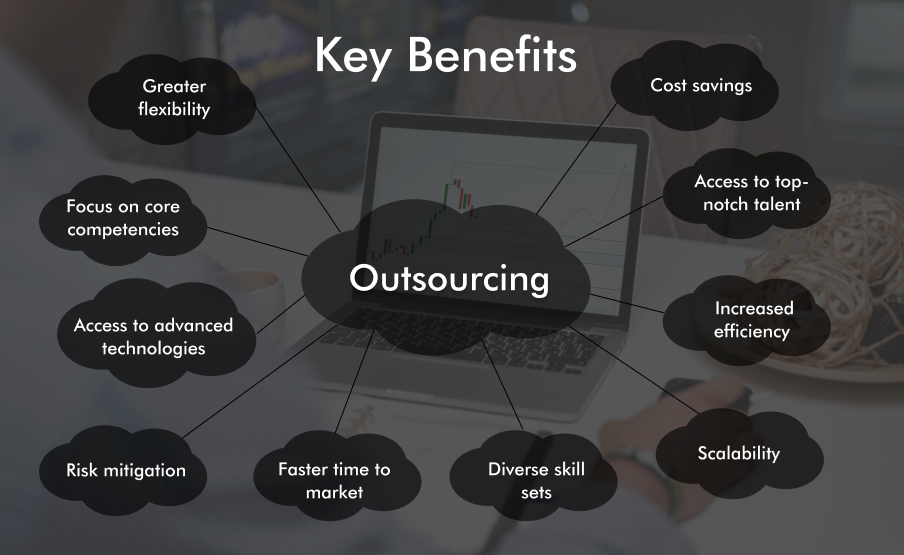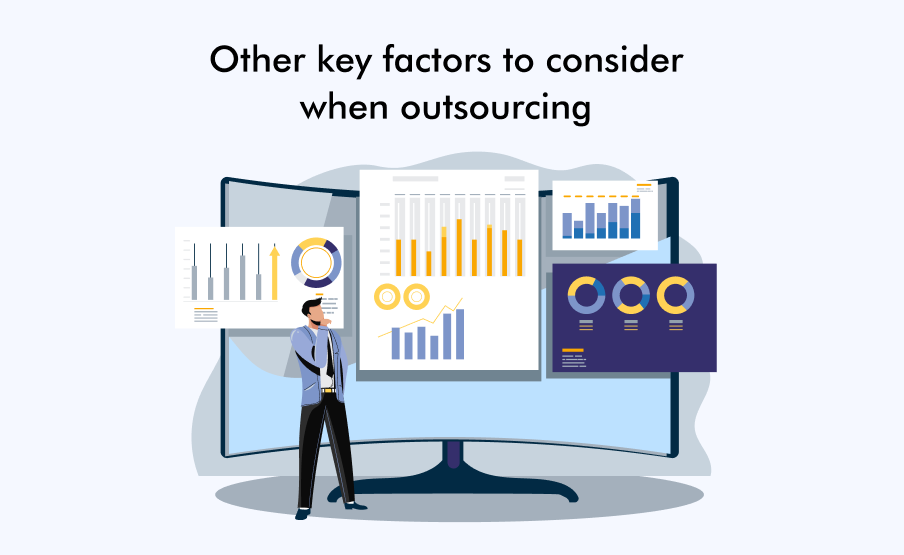In today’s fast-paced business world, companies are always looking for ways to stay competitive and increase their efficiency. One way to achieve this is by outsourcing software development services. In this blog, we will discuss what software outsourcing is, its benefits, and how to choose the right outsourcing partner.
Software outsourcing is the practice of hiring a third-party company or individual to develop software on behalf of another company. The outsourcing partner is responsible for designing, developing, testing, and maintaining the software. This approach can help companies save time and money while accessing top-notch talent and technology.
Key Benefits of Outsourcing

1. Cost savings:
Outsourcing software development services can help companies save money on labor costs, infrastructure, and equipment, especially in regions where the cost of living is lower.
2. Access to top-notch talent:
Outsourcing partners often have a team of highly skilled and experienced developers who can bring fresh ideas and innovative solutions to a project.
3. Increased efficiency:
Outsourcing allows companies to focus on their core business functions while leaving software development to the experts, resulting in increased efficiency and productivity.
4. Scalability:
Outsourcing partners can provide a flexible pricing model that aligns with a company’s budget and needs, allowing companies to scale up or down quickly as needed.
5. Diverse skill sets:
Outsourcing partners can offer a diverse range of skills and expertise, allowing companies to take on more complex projects and expand their offerings.
6. Faster time to market:
Outsourcing partners can often complete projects faster than in-house teams, reducing the time to market for new products and services.
7. Risk mitigation:
Outsourcing partners are often experienced in mitigating risks associated with software development, such as security, compliance, and project management.
8. Access to advanced technologies:
Outsourcing partners often have access to the latest technologies and tools, allowing companies to stay up-to-date and competitive.
9. Focus on core competencies:
Outsourcing allows companies to focus on their core business functions and strengths, rather than diverting resources to software development.
10. Greater flexibility:
Outsourcing partners can offer greater flexibility in terms of project scope, timelines, and pricing, allowing companies to adapt to changing market conditions and customer needs.
Some key points to consider when choosing the right outsourcing partner:

1. Experience:
Look for an outsourcing partner that has a proven track record of successfully completing software development projects similar to yours. Check their portfolio, client testimonials, and case studies to get an idea of their capabilities and expertise.
2. Expertise:
Choose an outsourcing partner that has expertise in the programming languages, frameworks, and technologies required for your project. Evaluate their technical skills by reviewing their code samples or conducting technical assessments.
3. Communication:
Effective communication is critical to the success of an outsourcing project. Choose a partner that has clear and transparent communication processes, including regular progress updates and feedback sessions. Make sure they are fluent in the language you prefer to communicate in.
4. Development process:
Evaluate the outsourcing partner’s development process, including their methodology, tools, and project management practices. Look for partners who use agile methodologies, which can help ensure that the project is completed on time and within budget.
5. Security protocols:
Ensure that the outsourcing partner has robust security protocols in place to protect sensitive data and intellectual property. Ask about their security policies and procedures, and verify that they comply with industry standards and regulations.
6. Scalability
Choose an outsourcing partner that can provide scalability and flexibility in terms of project scope, timelines, and pricing. Make sure that they can accommodate changes in project requirements or timelines without compromising quality.
7. Cultural fit:
Look for an outsourcing partner that shares your company’s values, culture, and work ethics. This can help ensure a smooth working relationship and reduce the risk of misunderstandings or conflicts.
8. Cost:
While cost should not be the only factor in choosing an outsourcing partner, it is important to consider pricing models and ensure that they align with your budget and needs. Compare prices and services from different vendors and choose the one that offers the best value for money.
By carefully evaluating potential outsourcing partners and selecting the one that aligns with your goals and values, you can ensure a successful software development project and a long-term, productive relationship.
Here are some other key factors to consider when outsourcing:

1. Location:
Consider the location of the outsourcing partner, as this can have an impact on communication, time zone differences, and cultural fit. Choose a partner that is geographically close or has experience working with clients in your region.
2. Intellectual property rights:
Ensure that the outsourcing partner has a clear understanding of your intellectual property rights and that they are willing to sign a non-disclosure agreement (NDA) to protect your confidential information.
3. Quality assurance:
Look for an outsourcing partner that has a robust quality assurance process in place, including code review, testing, and bug fixing. Make sure that they adhere to industry standards and best practices.
4. Support and maintenance:
Evaluate the outsourcing partner’s post-development support and maintenance services. Ensure that they can provide ongoing support, updates, and bug fixing, even after the project is completed.
5. Risk management:
Consider the outsourcing partner’s risk management capabilities, including their ability to anticipate and mitigate potential risks and issues that may arise during the project.
6. Business continuity plan:
Ensure that the outsourcing partner has a business continuity plan in place to ensure that the project can continue in the event of unforeseen circumstances, such as natural disasters, political instability, or economic downturns.

Outsourcing software development services can bring numerous benefits to businesses, including cost savings, access to top talent and advanced technologies, and increased efficiency. However, selecting the right outsourcing partner is critical to the success of the project. By considering factors such as experience, expertise, communication, security protocols, scalability, cultural fit, location, intellectual property rights, quality assurance, support and maintenance, risk management, and business continuity plan, businesses can make a more informed decision and choose a partner that aligns with their goals, values, and project needs. By working with a reliable and trustworthy outsourcing partner, businesses can stay competitive in today’s fast-paced business world and achieve their long-term objectives.








